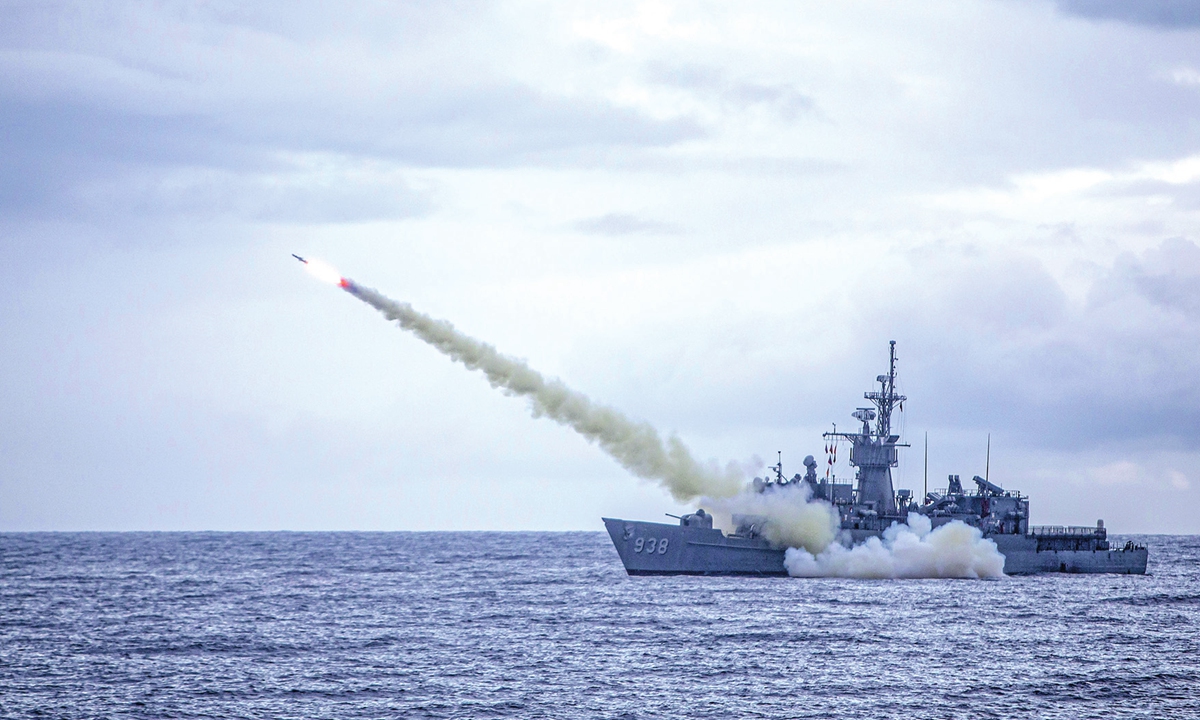O’Brien speech suggests Taiwan has only itself to rely on
By Leng Shumei Source: Global Times Published: 2020/10/8 19:53:41

A Taiwan warship launches a US-made Harpoon missile during the annual "Han Kuang" military drill on July 15, 2020. Photo: AFP
By putting forward a so-called "porcupine" strategy and asking the island of Taiwan to buy more weapons, Washington is sending a clear signal that it is reluctant to sacrifice its own interests to battle against Beijing for the sake of Taiwan if a military conflict bursts out, Chinese experts said amid US officials' recent calls for the island to spend more on its own defense.
At an event at the University of Nevada in Las Vegas on Wednesday, US national security adviser Robert O'Brien warned of the mainland's attempt to take Taiwan by force, saying amphibious landings were notoriously difficult and there was a lot of ambiguity about how the US would respond, Reuters reported Thursday.
He highlighted the huge gap between military capacities between the two sides and suggested that Taiwan should "turn themselves into a porcupine" as "lions generally don't like to eat porcupines."
It is an interesting theory as porcupines protect themselves against lions by their own thorns, Li Haidong, a professor at the Institute of International Relations of China Foreign Affairs University, told the Global Times on Thursday.
"So a clear signal sent by O'Brien is that the US - another lion - would not take action to battle with the mainland lion if military conflicts break out across the Taiwan Straits, and Taiwan should rely on itself," Li said.
Washington would not sacrifice its own interests to militarily clash with Beijing, and its real intention is to sell more outdated weapons to Taiwan at a high price, said Li Jie, a Beijing-based military expert.
Taiwan in August signed an agreement with US arms firm Lockheed Martin to buy 66 F-16V fighter jets, the latest version of the F-16 fighter jet, for $8 billion, making the unit price even higher than that of an F-35B.
The F-35 is a US 5th Generation fighter whose variants are scheduled to replace F-16 jets in the US forces.
One day before O'Brien's speech, David Helvey, the US principal deputy assistant secretary of defense for Indo-Pacific security affairs, said Taiwan's intention to boost defense spending by $1.4 billion next year was insufficient.
Taiwan needs to buy a large number of small lethal capability weapons, such as coastal defense cruise missiles, and spend intelligently in its development of indigenous weapons to defend itself, Helvey claimed.
Yet it would be like a mantis trying to stop a chariot. No matter how many weapons Taiwan buys from the US, the island lags too far behind the mainland in military capacity, according to Li Jie.
Posted in: HK/MACAO/TAIWAN,CHINA FOCUS